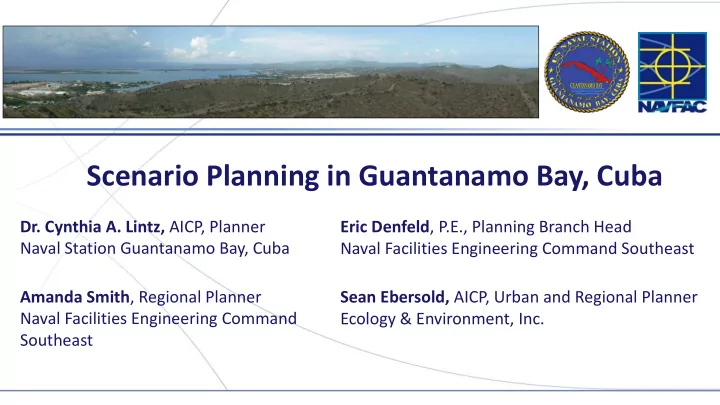

Scenario Planning in Guantanamo Bay, Cuba Dr. Cynthia A. Lintz, AICP, Planner Eric Denfeld , P.E., Planning Branch Head Naval Station Guantanamo Bay, Cuba Naval Facilities Engineering Command Southeast Amanda Smith , Regional Planner Sean Ebersold, AICP, Urban and Regional Planner Ecology & Environment, Inc. Naval Facilities Engineering Command Southeast 1
Session Objectives o Provide background information about Naval Station Guantanamo Bay, Cuba (NSGB) o Scenario planning overview o Discuss scenarios o Comparison with Guam Photo: Michael C. Woods 2
Location Photo: Michael C. Woods 3
Location 4
Location Photo: Michael C. Woods 5
Climate 6
Timeline 1903 US leases 45 square miles of land - 2,000 gold coins a year ($4,085). 1959 Castro’s communist revolutionaries take control. 1991 45,000 Cubans and Haitians are held in tent cities across the base. 2002 JTF Guantanamo activated to manage detention facility. 2009 President Obama takes office, vowing to close the detention facility. 2015 Cuba and the United States restore diplomatic relations. Photo: Michael C. Woods 7
Command Areas Photo: Michael C. Woods 8
Navy Master Planning 9
Constraints 10
Constraints 11
Existing Conditions Photo: Michael C. Woods 12
Scenario Planning Overview “ This present moment used to be the unimaginable future. ” Stewart Brand Photo: Michael C. Woods 13
Scenario Planning Overview o Scenario planning helps make sense and plan for an uncertain future. It doesn’t predict the future. o Scenarios allow a shared view of the future to be developed, and then… o Provide the opportunity for an organization to consider how it wants to position itself in that future. Maree Conway 14
Scenario Planning Overview o Scenario planning helps make sense and plan for an uncertain future. It doesn’t predict the future. o Scenarios allow a shared view of the future to be developed, and then… o Provide the opportunity for an organization to consider how it wants to position itself in that future. Maree Conway 15
Scenario Planning Overview o Scenario planning helps make sense and plan for an uncertain future. It doesn’t predict the future. o Scenarios allow a shared view of the future to be developed, and then… o Provide the opportunity for an organization to consider how it wants to position itself in that future. Maree Conway 16
Scenario Planning – Types of Futures o Possible - “might” happen (future knowledge) o Plausible - “could” happen (current knowledge) o Probable - “likely” to happen (current trends) o Preferable - “want” to happen (value judgements) Maree Conway 17
Scenario Planning – Types of Futures o Possible - “might” happen (future knowledge) o Plausible - “could” happen (current knowledge) o Probable - “likely” to happen (current trends) o Preferable - “want” to happen (value judgements) Maree Conway 18
Scenario Planning – Types of Futures o Possible - “might” happen (future knowledge) o Plausible - “could” happen (current knowledge) o Probable - “likely” to happen (current trends) o Preferable - “want” to happen (value judgements) Maree Conway 19
Scenario Planning – Types of Futures o Possible - “might” happen (future knowledge) o Plausible - “could” happen (current knowledge) o Probable - “likely” to happen (current trends) o Preferable - “want” to happen (value judgements) Maree Conway Guantanamo Bay’s scenario planning considers what’s plausible . 20
Guantanamo Bay Scenarios Scenario 1. Hurricane or Earthquake Scenario 2. New Mission Requirements Scenario 3. Migrant Surge Photo: Michael C. Woods 21
Scenario 1. Hurricane or Earthquake 1. A major hurricane or earthquake causes significant damage and disruption to carrying out mission requirements. 2. Critical water supply and treatment, and power generation infrastructure are damaged leaving no water or electricity. What’s the shared view? Probable - “likely” to happen (current trends) Possible - “might” happen (future knowledge) Plausible - “could” happen (current knowledge) Preferable - “want” to happen (value judgements) 22
Scenario 1. Hurricane or Earthquake 23
Scenario 2. New Mission Requirements 1. With increased funding for the military, there is a new need for the base to support larger ships. 2. Increased infrastructure demands and base support requirements could occur. What’s the shared view? Photo: Michael C. Woods Probable - “likely” to happen (current trends) Possible - “might” happen (future knowledge) Plausible - “could” happen (current knowledge) Preferable - “want” to happen (value judgements) 24
Scenario 2. New Mission Requirements 25
Scenario 2. New Mission Requirements 26
Scenario 3. Migrant Surge 1. Similar to 1994, a flood of refugees from Venezuela, Haiti, and/or Cuba come to the base. Within the first week, 13,000 refugees arrive and more are expected. 2. Knowing past trends, we can expect that this population will be here at least a year before the refugees are resettled. What’s the shared view? Photo: Dvidshub.net Probable - “likely” to happen (current trends) Possible - “might” happen (future knowledge) Plausible - “could” happen (current knowledge) Preferable - “want” to happen (value judgements) 27
Scenario 3. Migrant Surge 28
Using a Comparison (Guam) 29
Using a Comparison (Guam) 30
Thank You! Dr. Cynthia A. Lintz, AICP, Eric Denfeld, P.E. Community Planner Planning Branch Head Naval Station Guantanamo Bay, Cuba Naval Facilities Engineering Cynthia.Lintz@gtmo.navy.mil Command - Southeast eric.denfeld@navy.mil Amanda Smith, Sean Ebersold, AICP, Regional Planner Urban and Regional Planner Naval Facilities Engineering Ecology & Environment, Inc. Command - Southeast sebersold@ene.com amanda.e.smith@navy.mil Photo: Michael C. Woods 31
Recommend
More recommend